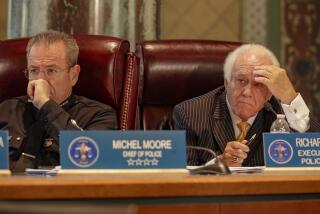Law Lists Rights, Lacks Teeth : Intent of W. Hollywood Domestic Partnership Ordinance Clear but Impact Isn’t
West Hollywood’s new law allowing unmarried couples to register with the city is the latest in a series of ordinances passed this year by the City Council in an attempt to broaden citizens’ rights.
But unlike the earlier ordinances, which mandated immediate changes and backed them up with strong criminal penalties, the new “domestic partnership” law has almost no legal strength.
The law, which the council unanimously adopted last week, gives unmarried couples the right to register their relationships with the city and grants them jail and hospital visitation rights. It also provides a framework to eventually provide insurance coverage to the partners of city employees.
But some difficulties have shown up. Although the registration process will start within a month, the city Personnel Benefits Commission has spent two months unsuccessfully trying to find an insurance company willing to provide coverage for domestic partners. And visitation rights, although largely symbolic, will require negotiation to be guaranteed.
“We’re really on the ground floor on all of this,” said Peter McAlear, an accountant heading the search. “It’s going to take some time to get people used to the idea of domestic partnership.”
The commission is looking for medical insurance that would include either a $250- or a $500-deductible policy with provisions for eye, dental and mental health care, prescription cards and maternity coverage.
Thus far, the commission has done no better than the City of Berkeley, which passed a similar domestic partnership law last year and is still searching for an insurance provider to cover the city’s 1,100 employees.
“We’ve talked to six insurance brokers so far and they’ve all told us there’s no precedent they can look at to base their premiums on,” McAlear said. “Nobody’s willing to break the ice.”
West Hollywood is also having trouble finding an insurer, McAlear said, because of the few city employees involved. Once the city hires a full staff, those needing insurance coverage--including council members and their aides--will probably not exceed 40 people.
“For insurance companies, that’s small potatoes,” McAlear said. “If you had cities like San Francisco (where a domestic partnership law was vetoed by Mayor Diane Feinstein) or New York looking for insurers for domestic partners, I think there would be more interest.”
McAlear said several brokers have indicated that some insurance companies might be willing to provide limited coverage if the city also paid for some of it.
“We’ve been told that an insurance company might be willing to provide employees and their partners with a $1,000 deductible on medical insurance, for example, and then city would take care of $750 of the deductible,” he said. “That way, the employee would only have a $250 deductible to deal with.”
If the city is unable to find a major insurer, it could develop a self-insurance program. “One way or another, we’ll come up with some way to include domestic partners,” McAlear said. “It just would be nice to start a precedent with a major insurer.”
The city soon will advertise for bids from insurance companies and plans an open meeting for bidders.
But insurance is not the only clause requiring negotiation. Mayor Valerie Terrigno, who sponsored the domestic partnership measure, said she also plans to negotiate for jail and hospital visitation rights for domestic partners.
The only jail in West Hollywood is a lock-up at the sheriff’s station. Capt. James Cook, commander of the station, said the station does not allow visitors at the lock-up.
Terrigno said she did not expect that policy to change, but said she hoped to arrange a guarantee for the visitation rights of domestic partners at the county jail where prisoners’ relatives and friends are already allowed to visit.
And although there are no major hospital complexes in West Hollywood, Terrigno said she plans to meet with officials at Cedars-Sinai Medical Center, where many West Hollywood residents go for hospital treatment, particularly homosexuals afflicted with AIDS.
“I don’t think it would be a problem with them,” Terrigno said.
Paula Correia, the hospital’s associate director for public relations, agreed, saying that the hospital allows relatives and friends of patients to visit during regular hours. Correia said the only time visits might pose a problem for domestic partners is when a patient’s relatives object.
“Those situations are extremely rare,” Correia said. “We’ve dealt with them on a case-by-case basis.”
Terrigno said she also hoped to come up with a provision for the city’s rent control law--which is expected to be drawn by mid-May--which would limit or eliminate rent increases for domestic partners.
“We’ve had a lot of complaints about rents going up when a partner moves into an apartment,” Terrigno said. “Some landlords don’t put in an increase when partners move in. Others do. We have to develop something uniform.”
Perhaps the only certainty about the law is that within a month, unmarried West Hollywood residents will be able register their relationships at city hall.
City officials are working to develop an official domestic partnership certificate--suitable for framing--and an official ceremony to mark the opening of the city’s domestic partnership registry.
“We’ve heard from a few people who would like to be the first couple to register,” Terrigno said. “I’ve noticed a lot of people drop by to ask about the new law and leave with an application form. I think people are taking it very seriously.”
More to Read
Sign up for Essential California
The most important California stories and recommendations in your inbox every morning.
You may occasionally receive promotional content from the Los Angeles Times.










